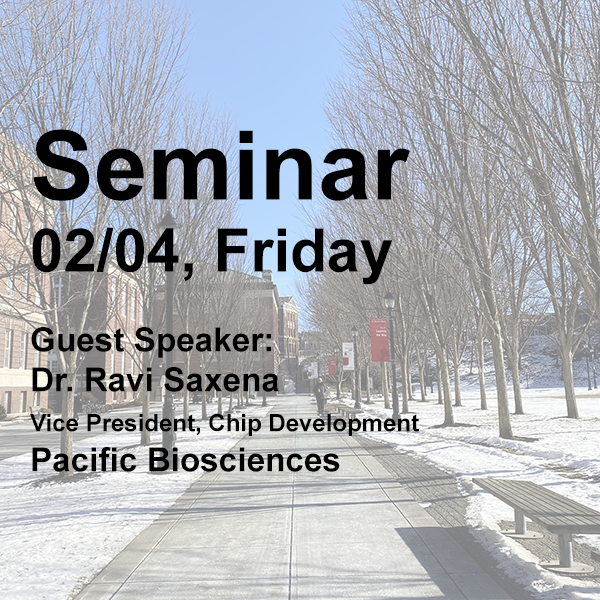
Center for Materials, Devices and Integrated Systems
Center for Biotechnology and Interdisciplinary Studies
Seminar
Co-sponsored by the NIGMS Biomolecular Science and Engineering Training Program
February 4 (Friday), 2022: 12:00 pm – 1:30 pm (ET)
“Technology Development for Long Read Genome Sequencing”
by: Dr. Ravi Saxena
Vice President, Chip Development at Pacific Biosciences
Join via Webex, Password:12345
Abstract: The COVID-19 pandemic continues to be a major global epidemiological challenge with the ongoing emergence of new strain lineages that are more contagious, more virulent, drug resistant and in some cases evade vaccine-induced immunity. Highly accurate, long read sequencing allows researchers to fully characterize all the variants within a viral population as opposed to just the dominant variant and is less susceptible to highly mutating viruses. This is one of the many applications that PacBio’s proprietary SMRT™ Sequencing addresses, making it now the primary tool to produce reference-grade genomes for microbes, plants, animals and people.
This talk will cover a brief history of Pacbio and an overview of SMRT ™ Sequencing- sometimes known as the third-generation or Long-Read Genome sequencing. The focus of the talk will be on the technology and innovations behind PacBio’s products. A more detailed view of the complex biology of various genomes, requires an interdisciplinary approach involving physics, biochemistry and engineering. This has allowed the team at Pacbio to create some of the world’s most advanced sequencing products, enabling the promise of genomics to better human health.
Biography: Ravi Saxena is currently the Vice President, Chip Development at Pacific Biosciences. In this role, he manages the complete Product Life Cycle of Integrated Semiconductor Devices used in PacBio’s Genome Sequencing Solutions. He joined PacBio in 2008 to lead the scaling up of SMRT™ Sequencing Technology from a Lab to a High-Volume CMOS foundry and patented the original process architecture. Following a successful IPO and the launch of RSII, the company’s first commercial platform, he led the product design and process integration for the Sequel Platform- integrating diverse components including, CMOS Sensors, Photonic Light Circuits, Surface Chemistry, Micro-Fluidics and Advanced Packaging. Prior to Pacbio, Ravi was with Intel Corp. where he worked on advanced lithography and integration for Flash Memory and Logic Devices. Ravi has a Bachelor’s from Indian Institute of Technology Bombay, followed by a Master’s and Ph. D. in Chemical Engineering from Rensselaer Polytechnic Institute, New York. He is listed as the inventor on over 10 U.S. patents and numerous published patent applications. He is also the author of over 20 peer reviewed scientific publications with close to 700 citations.
Join via Webex, Password:12345
contact: Deniz Rende (rended3@rpi.edu)
